
CEE at Rio+20 Conference
CEE hosted a side event at the Rio+20 Conference on June 15, 2012. The event included three panel discussions which provided the opportunity to share a variety of innovative, enlightening and dynamic ideas on using ESD as a driver of change towards a green economy. Eminent panelists from different parts of the world contributed to the discussions.
As a part of the first panel discussion on Understanding ESD and its role in fostering a Green Economy, Kartikeya Sarabhai, Director, CEE who chaired the discussion, stressed the enabling role of education to take positive actions towards sustainability. Delfin Ganapin, Global Manager, GEF/ UNDP SGP talked about 'inclusive green economy', stressing the significance of social equity. Osamu Abe, Board Member, ESD-J drew attention to new ways of looking at corporate social responsibility taking into consideration ESD. Ashok Khosla, President, IUCN spoke about the role that youth and children can play in moving towards a sustainable world.
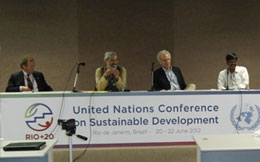
Panelists sharing thoughts on ESD interventions in Formal and Non-Formal Education and in Education policy.
The second discussion focused on ESD interventions in Formal and Non-Formal Education and in Education Policy. Jose Archer, President of the Board of Directors ABAE/FEE Portugal, and Pramod Sharma, Programme Coordinator, CEE, emphasised the importance of practical learning or action-oriented learning for children and youth. Kehkashan Basu, a youth participant suggested that education be recognized as a birthright for all children, and especially for the girl child. Rick Clugston , Programme Coordinator, ECI highlighted the challenges which universities face to take action for sustainability in the midst of an unsustainable world. Zinaida Fadeeva, Associate Fellow, UNU-IAS highlighted that higher education institutions have an important role to play because they have the required knowledge, expertise, and necessary resources which help in engagement of community and address local issues.
In the third panel discussion on ESD and Eco-industrial Development, Sudhir Sinha, Country Head CSR and R&R, ArcelorMittal stressed the importance of educating employees about sustainability, and educating customers about sustainable lifestyle. Rixa Schwarz, Programme Coordinator, CEE shared an example of a waste management museum which acts as a learning centre for the community, to demonstrate the important role of partnerships. Prabhjot Sodhi, Regional Director, CEE said that involvement of local people, and empowering them to address local issues is important for a green economy.
The side event was organized by CEE in collaboration with United Nations University – Institute of Advanced Studies (UNU-IAS), Earth Charter International (ECI), GEF/UNDP Small Grants Programme, ESD – Japan (ESD-J), ArcelorMittal, and Foundation for Environmental Education (FEE). The event was marked by the active participation of about 60 participants.
Ecological Restoration
CEE Tamil Nadu is implementing a mangrove restoration project which focuses on identifying potential sites for mangrove plantation and protection. As part of this project supported by the UPS Foundation, CEE Tamil Nadu will be focusing on the Pulicat backwater area, with activities which include site survey, plantation and nursery raising, through involving the Forest Department and local fisherfolk in the mangrove restoration process.
A team of local fisherfolk, field staff of the Forest Department and CEE Tamil Nadu conducted a field survey in Pulicat (Palaverkadu) to check the survival rates of the Rhizopora mucronata mangrove species that were introduced through direct dibbling in early December 2011.
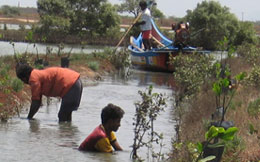
Around 300 mangrove saplings were transported by boat and planted across specific sites between 15-20 June.
The survey also helped them to identify specific sites where Rhizopora spp. could be planted. Following this, the team planned another round of plantations using the nursery stock (at the nearby Forest Department Campus) maintained by the field staff and an Irula family (one of the scheduled tribes of India). The fisherfolk's knowledge of tide and soil conditions; timing of trips and skillful maneuvering of the boat to enter a previously dug shallow canal (around 300 m. long) to plant these saplings were invaluable for the success of the exercise.
Anandshala (Thada) Teachers' capacity building workshop
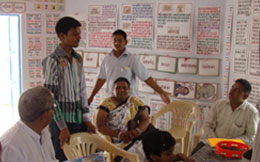
Interactions at Anandshala, Waghodia.
The Anandshala project is being implemented in the Government Upper Primary School at Thada in Alwar, Rajasthan, since October 2011. A five-day exposure-cum-training was organized for four interested teachers from the school, along with their family members, from June 21-26.
The capacity-building programme was structured through exposure visits, interactions, sessions etc. The group spent a day at the CEE campus where Ms. Shivani Jain, Programme Director, CEE and Mr. Parthesh Pandya, Sr. Programme Coordinator , CEE talked about the role that teachers could play in changing the scenario of education, and Mr. Dipak Taraiya, an educational trainer, shared his thoughts with them through a motivating talk on the 'Funda of Favorite Teachers'
A visit to the Anandshala school of Waghodia, which was awarded the best Anandshala School Award provided opportunity to interact with teachers, students and villagers to understand their vision of Anandshala and how they had achieved it. This was through an overnight stay by the visiting families at the homes of the Waghodia teachers.
The group visited the Gujarat Council for Educational Research and Technology (GCERT) and Bhaskaracharya Institute For Space Applications and Geo-Informatics and learnt about GCERT's role, functions, systems and the training opportunities and facilities that teachers of Gujarat receive, by interacting with the Director of GCERT Mr. Joshi.
They also visited some historical places like the stepwell of Adalaj, Lothal archeological site, UNESCO world heritage site Fort of Champaner, and Gandhi Ashram. The trip not only added to the exposure and knowledge of the teachers, but also set an example as to how educational tours can be made most effective through proper planning. This five-day exposure cum training provided the teachers from Thada with an understanding about what an Anandshala School means and also as to what their roles and responsibilities are towards developing such a school. The Anandshala Thada project is being funded by Ashiana Housing Ltd (AHL), Bhiwadi, Delhi.
Induction Training for New Recruits of Goa State Pollution Control Board
42 new recruits of Goa State Pollution Control Board (GSPCB) attended an eight-day induction training aimed at imparting hands-on and basic understanding of the core functioning of the Pollution Control Boards.
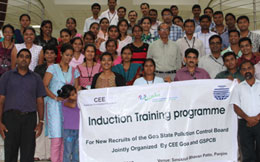 The training programme included classroom presentation, film shows and field visits.
The training programme included classroom presentation, film shows and field visits.
CEE Goa conducted this training from June 5-13. The module included briefing on the Board's mandate, objectives and functions; conducting site inspection and submission of technical reports for appropriate policy decision; technical knowhow of operating various laboratory gadgets, and compliance and monitoring of ISO standards. Experts from Central Pollution Control Board, GIZ; National Law School of India University; CEE; Goa Foundation, Members of Technical Advisory Committee of GSPCB made presentations and shared their experiences during the training.
Technical expert lawyers in the field of environmental law like Adv. Norma Alvares and Adv. Ritwik Dutta were also invited to talk to the participants on environmental litigations and the role of newly formed legal institutions such as Green Tribunal. Prof. Madhav Gadgil, an eminent ecologist and Shri Ramesh Gauns, a teacher, shared their thoughts related to Quality of Environmental Impact Assessment, its process and violation of Environmental Clearance conditions.
Presentation on Western Ghats Ecology Expert Panel Report
On June 14, CEE Goa organized a presentation by Prof. Madhav Gadgil on the Western Ghats Ecology Expert Panel (WGEEP) Report. 250 participants from government departments, NGOs, research institutions, industry representatives and individuals attended this lecture.
Prof. Madhav Gadgil was the Chairman of WGEEP, which was constituted by the Ministry of Environment and Forests (MoEF), Govt. of India in February 2010. As per the Panel's mandate the report recommends measures to assist the government in the preservation, conservation and rejuvenation of the environmentally sensitive and ecologically significant region of the Western Ghats. The report that was submitted in September 2011 by the Panel has been uploaded by MoEF website (www.moef.nic.in).
Paryavaran Mitra News
Electricity Hand Print Calculator
Paryavaran Mitra launched the Hand Print Electricity Calculator, an interactive online tool to calculate the electricity consumption in terms of kWh, as well as to find out carbon dioxide emissions. The calculator is currently being used to target electricity savings for Paryavaran Mitra Power Count Challenge. To use this Hand Print Calculator, click here.

Hand Print is an action and solution-oriented tool developed by CEE to help measure positive actions at individual, community, national and global level. It is a measure of ESD action; action that is directed to decrease the human footprint for a sustainable world.
Orientation Workshops
A series of workshops were organized by CEE Himalaya in Kangra, Hamirpur, Kullu and Mandi Districts of Himachal Pradesh from June 16-22. 623 teachers and principals from 537 registered schools participated in these workshops. The participants were oriented to the Paryavaran Mitra programme, its vision and its goals; the collaborative efforts of CEE, the State Education Departments and local NGOs; the five themes (Biodiversity and Greening, Culture and Heritage, Energy, Water and Sanitation, Waste Management) for action projects; projects being undertaken by existing eco-clubs; the opportunities for national and international exposure for schools, and success stories from other schools and regions. The workshops were facilitated by partner NGOs, officials from the Education Department, and team CEE Himalaya.
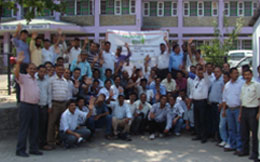
The teachers and principals of all the participating schools took the Paryavaran Mitra pledge and expressed their interest to become Paryavaran Sathis (Friends of Environment)
Awarding Schools
Paryavaran Mitra action projects were carried out in Andhra Pradesh through a State Level Competition from November 2011 to February 2012. 26 Best Paryavaran Mitra Schools and 7 Best Paryavaran Mitra Plus Schools will be awarded at an event to be held at Hyderabad on July 30, 2012. The winning schools were selected through an evaluation process including reports submitted by these schools, as well as monitoring visits conducted by the CEE Paryavaran Mitra teams. For more information on this event please click here.
Paryavaran Mitra at Science Express Biodiversity Special
The Science Express: Biodiversity Special (SEBS) since starting its journey from New Delhi on June 5 has toured to 12 locations in the north and north-east of India and is now travelling to the eastern region. CEE Paryavaran Mitra teams in these locations are conducting painting competitions, environmental games and training of teachers. Approximately 3000 children have taken part in these activities, and 600 teachers have been trained in Environmental Education in the specially designed coach.
'An excellent idea, especially the coach on teacher's training programme. I appreciate this effort as you are reaching out to the students and teachers all over India. Keep up the good work.' - Dr. P. K. Joshi, Homi Bhaba Centre for Science Education
For more information on what is going on at various stations, click here.
ITP in ESD in Formal Education 2011 concludes successfully in Bangladesh and Indonesia
CEE is the Asia Coordinating Agency for the Advanced International Training Programme (ITP) in Education for Sustainable Development (ESD) in Formal Education (FE). Coordinated globally by NIRAS Natura AB, Sweden, this nine-month long training programme runs in five phases. For the year 2011, the priority countries were Afghanistan, Bangladesh, Cambodia, India, and Indonesia. The Bangladesh Final National Workshop (FNW) was held on June 19 at the Directorate of Primary Education, Dhaka, Bangladesh, and the Indonesia FNW was held on June 27 at Yogya Plaza Hotel, Yogyakarta, Indonesia.
The workshops provided the 6 teams, 3 teams each from Bangladesh and Indonesia, an opportunity to share their enhanced work in ESD in Formal Education as implemented under the ITP. Besides showcasing their change projects, the 6 institutional teams, shared their feedback on the programme structure and content. The teams represented the Directorate of Primary Education and the Directorate of Secondary and Higher Education in Bangladesh; and in Indonesia the teams represented World Wide Fund for Nature -Indonesia, Vocational Education Development Centre for Agriculture and Titian Foundation.
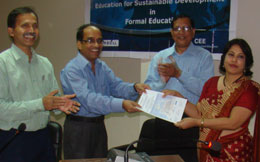
Successful teams were awarded certificates.
It was encouraging to learn that a 2009 alumni of the ITP Mr. Nazrul Islam Khan, PS to the PMO, Government of Bangladesh had planned a grand event in the light of his change project titled 'Pupils Participation in Decision Making: Elected Student Councils in Primary Schools of Bangladesh' being scaled-up to the entire country. A participant of the current year of the ITP Ms. Adriani Rini Ratna, Environmental Education and Outreach Coordinator, WWF-Indonesia had initiated an ESD Network in the country.
20 participants attended the Bangladesh Closing workshop which was facilitated by Mr. Parthesh Pandya, Sr. Programme Coordinator, Rural Programmes Group, CEE. 18 participants attended the Indonesia Closing Workshop facilitated by Ms. Carol D'souza, Project Officer, Networking and Capacity Building Group, CEE.
Students of Pandit Deendayal Petroleum University visit CEE
The third batch of the School of Liberal Studies (SLS) from Pandit Deendayal Petroleum University (PDPU), Gandhinagar visited CEE as part of their induction program. The students gained an insight on CEE's initiatives to raise awareness on environmental issues and concerns and actions for sustainable development and also learnt about the internship opportunities at CEE. During this visit students also registered their Pledge for Life - actions to conserve and protect biodiversity, an initiative of National Biodiversity Authority.
The 4th Khoryug Conference on Environmental Protection for Khoryug Association of the Tibet Buddhist Monasteries
As part of CEE Himalaya's drive to create a cadre of monks trained in DRR, the 4th Khoryug Conference on Environmental Protection for Khoryug Association of Tibet Buddhist Monasteries was held on June 5-9 at Norbulinkha, Dharamsala. The conference discussions included topics on biodiversity conservation, climate change and disaster preparedness in general, and on high altitude habitations and fragile ecosystems in particular.
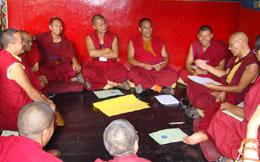
Over 100 monks and nuns from monasteries and nunneries across India, Nepal and Bhutan participated in this workshop.
The deliberations of the workshop covered the rapid loss of biodiversity, benefits of it, especially in the high altitude fragile areas where a large Buddhist population lives, and how biodiversity protects us from natural disasters. Some other issues that were discussed included what impacts will climate change have in high range landscapes like the Tibetan Plateau and the Himalayas? How can monasteries safeguard themselves during any disaster and how it is critical for them to develop a disaster management plan as well as an eco-friendly architecture that suits the high altitude? Towards the end of this workshop, a Buddhist Declaration on Climate Change was prepared and presented by His Holiness, the Karmapa.
CEE Himalaya and WWF India have earlier organized similar DRR workshops in Sikkim and Himachal Pradesh. CEE Himalaya and WWF USA partnered in facilitaing the Khoryug workshop which was sponsored by Rangjung Khoryug Sungkyob Tsokpa.
CEE